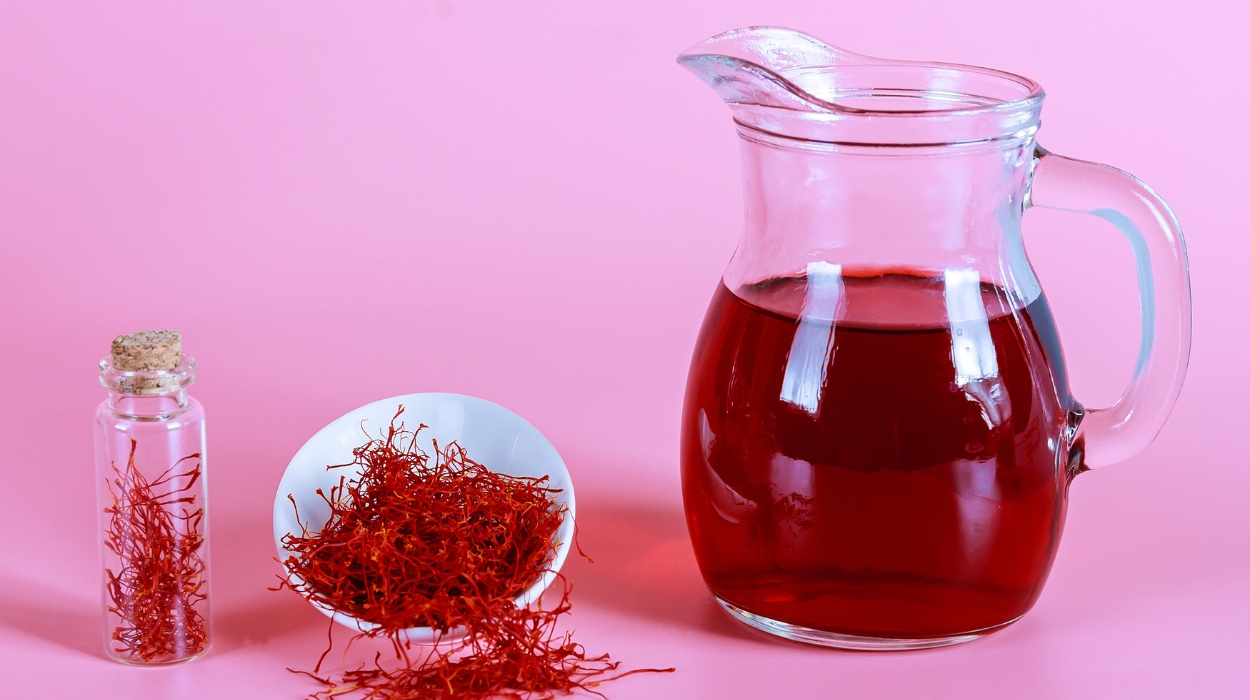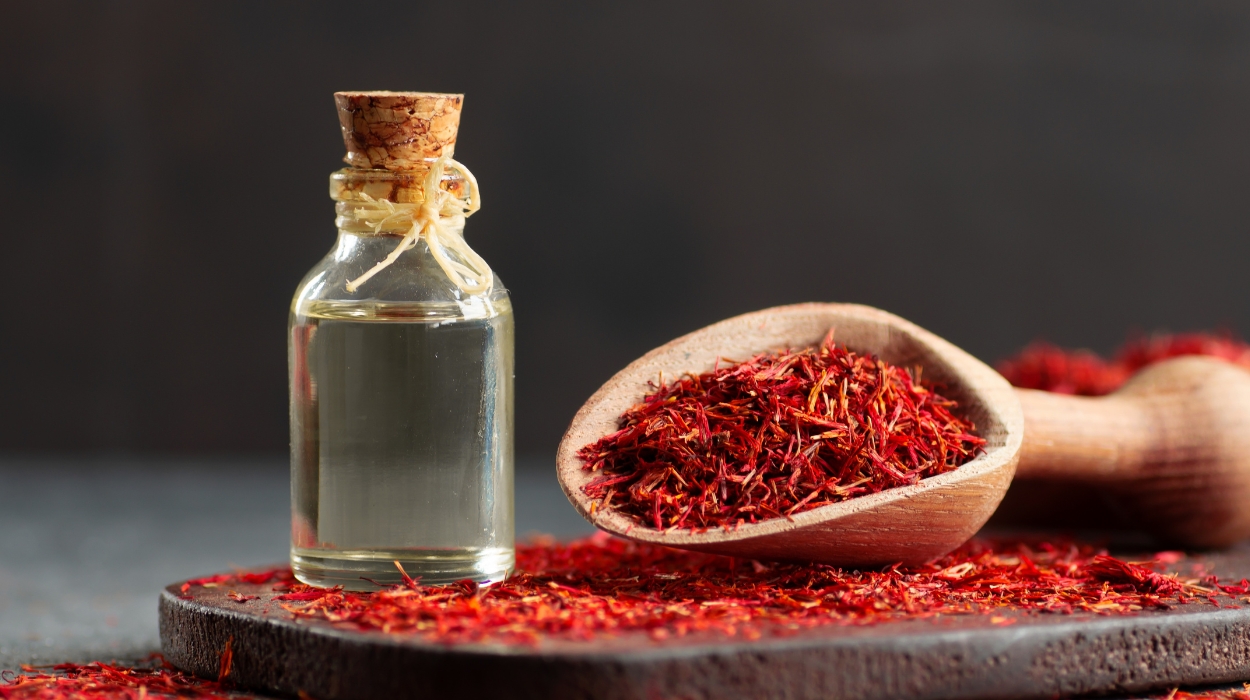Saffron offers several health benefits beyond its culinary appeal, from mood enhancement to antioxidant properties. It even has significant potential for natural weight loss.
This guide will navigate the ins and outs of incorporating saffron extract into your diet. We’ll discuss the potential side effects and learn more about how to use saffron extract to lose weight.
Learn why saffron is more than a kitchen staple. It’s a powerful tool in your journey to lose weight. Let’s dive into the advantages of saffron extract.
Five Ways To Use Saffron Extract To Lose Weight
Here are some ways to use saffron for weight loss:
- Drink saffron tea.
- Follow saffron-infused recipes.
- Take saffron supplements.
- Utilize saffron for emotional eating support.
- Combine saffron with a balanced diet and regular exercise.
How To Use Saffron Extract To Lose Weight

Are you on a weight loss journey? Consider using the natural potency of saffron extract to improve your weight loss results. Derived from the Crocus sativus flower, saffron has been used in various forms for its many health benefits.
Its weight management properties make saffron a popular addition to any weight loss routine. Here’s a guide on how to use saffron extract for your weight loss efforts:
Drink Saffron Tea
Steep some saffron leaves in hot water and allow the aromatic compounds to infuse. Consuming saffron tea before meals can create a sense of satiety,[1] reducing the likelihood of overeating. Saffron’s active antioxidant compounds, such as crocin and safranal,[1] may help control appetite and minimize unnecessary calorie intake.
You can play around with added flavor enhancers. You can enhance your detox tea with honey or citrus for added flavor and health benefits. But be careful not to go overboard with added calories and sugars. Overall, saffron is an excellent appetite-suppressant tea that tastes delicious.
Follow Saffron-Infused Recipes
You can also unlock the benefits of saffron by adding it to various dishes. From soup to rice, saffron can enhance flavor and regulate appetite. When you eat saffron, it helps contribute to a feeling of fullness,[1] encouraging food consumption moderation.
Experiment with saffron-infused recipes to make your weight loss journey a satisfying culinary adventure.
Take Saffron Supplements
Saffron supplements may complement your weight loss efforts by targeting specific appetite control and metabolism pathways.[2] You should find a standardized saffron extract supplement to ensure a consistent and potent dosage of the spice’s active ingredients.
Follow the recommended guidelines health care professionals or product labels provide to achieve optimal results safely. Always consult a healthcare professional before starting saffron supplementation to address individual health considerations.
Utilize Saffron For Emotional Eating Support
Capitalize on saffron’s mood-regulating properties to alleviate stress-induced emotional eating. Saffron may help regulate serotonin levels,[3] positively impacting mood and potentially reducing your desire to eat comfort foods.
Integrate saffron into your diet during emotionally challenging periods to create a more balanced and mindful approach to eating. Its antidepressant effects[3] can modulate certain chemical levels in the brain to combat depression. You can also use saffron to counteract the effects of the stress hormone cortisol.
Combine Saffron With A Balanced Diet And Regular Exercise
One of the best benefits of saffron is its delicious taste. Saffron is earthy, floral, and slightly sweet. It has a distinct flavor, often honey-like or hay-like, that excites the tastebuds.
The flavor is subtly bitter, with a delicate balance that enhances savory and sweet dishes. Saffron’s distinct flavors make it an excellent tool for mindful eating. By using saffron to flavor food, you can engage with the sensory aspects of meals, promoting slower, more intentional eating.
Establish a connection between eating and the nourishment your food provides. Combine saffron with a balanced diet and regular exercise for a holistic approach to weight loss.
Health Benefits Of Saffron

There are many health benefits of saffron, a natural remedy for managing many conditions and symptoms. Here are the most known benefits of the Crocus sativus flower:
Appetite Control
The active compounds in saffron aid in appetite control. By inducing a sense of satiety, saffron can assist individuals in maintaining a calorie deficit. This is a critical component in effective weight management.
Both pre-clinical and clinical studies are needed to assess the full effects of saffron. However, research shows that it is effective in targeting appetite control[4] centers, limiting food intake, and decreasing feelings of hunger.
Metabolism Supports And Fat-Burning Properties
Saffron is believed to influence metabolic processes,[4] potentially enhancing calorie expenditure. Active compounds in saffron may contribute to the fat-burning mechanism. Saffron can be a natural fat burner to lower your body mass index when used alongside a balanced diet and regular exercise.
Research also shows that the carotenoids and phytosterols in saffron[5] also have beneficial effects on metabolic function. Those taking saffron supplements in the trial had a significant reduction in their waist circumferences. While there was no significant effect on HA1C levels, fasting plasma glucose was reduced significantly in participants using saffron for more than 12 weeks.
Premenstrual Syndrome Symptom Alleviation
Saffron’s mood-enhancing properties may also help alleviate PMS symptoms, such as mood swings and irritability.
A meta-analysis showed that saffron supplementation might regulate psychological/behavioral outcomes and lead to PMS symptom relief[6] in people with regular menstrual cycles. It has also been shown to improve sexual function related to infertility.
Premenstrual dysphoric disorder, or PMDD, is a much more severe form of PMS. Studies conducted to test the efficacy of saffron PMDD management[7] also showed that the herb worked well for the treatment of symptoms with minimal adverse effects. This included recurrent mental symptoms, depression, aggression, irritability, and symptom impact on the social, interpersonal, and occupational aspects of life.
Coronary Artery Disease Prevention
Saffron is rich in antioxidants, which may protect the cardiovascular system by neutralizing free radicals and reducing oxidative stress.[8] Some studies suggest that saffron may also help regulate cholesterol levels. This can potentially reduce your risk of coronary artery disease.
Saffron also has anti-inflammatory effects that contribute to cardiovascular health. While further studies are needed, the results of current studies are promising regarding the use of saffron to improve dietary intake[9] and body composition in patients with coronary artery disease.
Alzheimer’s Disease Management
Saffron also contains compounds that exhibit neuroprotective properties, potentially supporting cognitive function.[10] Preliminary research suggests that saffron may positively impact memory and learning. While more research is needed, it is suggested that saffron offers potential benefits[11] for Alzheimer’s patients.
Saffron may also play a role in reducing oxidative stress in the brain. This can slow down the progression of Alzheimer’s disease in patients already diagnosed.
Erectile Dysfunction Support
Saffron may contribute to improved blood flow by promoting vasodilation. Research shows that saffron has a significant positive effect on erectile function improvement[12] and sexual intercourse satisfaction. The use of saffron supplements resulted in an improvement in erectile function and the subscales of sexual dysfunction, including sexual desire, sexual satisfaction, and general satisfaction.
Treatment Of Depression
Through studies on the impact of saffron on the nervous system, it was found that the herb can help with the treatment of mild to moderate depression. Patients were evaluated based on the Hamilton Depression Rating Scale, and studies found that six weeks of saffron[13] administration significantly improved participants’ moods.
Potential Side Effects
While saffron extract boasts numerous health benefits, it’s essential to be aware of potential side effects. The herb should be used in therapeutic doses[14] to prevent toxicity.
- Allergic reactions: Allergies to saffron are rare but possible. Monitor for symptoms like rash, itching, or swelling. Seek medical attention if they occur.
- Digestive issues: Some people may experience mild digestive discomfort, particularly when consuming large quantities of saffron. Nausea and diarrhea may occur. Contact a healthcare professional for help treating mild symptoms.
- Blood pressure regulation: Saffron may lower blood pressure. Therefore, those on high blood pressure medications should use saffron cautiously to avoid excessive blood pressure reduction.
- Pregnancy and iactation: Pregnant or breastfeeding individuals should consult healthcare professionals before using saffron. More research is needed to determine its safety during pregnancy and lactation.
- Drug interactions: Saffron may also have blood-thinning effects. People on anticoagulant medications should consult with a healthcare provider to manage potential interactions.
- Central nervous system effects: High doses of saffron may cause sedation. Those operating machinery or those in sedation-sensitive conditions should use saffron cautiously.
- Hypoglycemic effects: Saffron may lower blood sugar levels.[15] People with diabetes should monitor their levels closely and consult a healthcare professional for proper management.
- Staining properties: Excessive saffron consumption may lead to temporary staining of the skin and mucous membranes. While this is generally harmless, it should be noted.
Does Saffron Help With Weight Loss?
Saffron has been associated with potential weight loss benefits. However, further research and scientific evidence are needed to fully understand the impact of saffron.
One key aspect is saffron’s impact on mood regulation, which influences serotonin levels. Elevated serotonin levels may improve moderate depression and reduce emotional eating and cravings. Additionally, the compounds crocin and safranal have an appetite-suppressing effect [16] and are believed to enhance satiety and further minimize overeating.
When using saffron in supplement form, it’s important to remember that individual responses vary. Check out reviews if you are looking for supplements for your weight loss journey.
You should consult your healthcare provider if you have pre-existing medical conditions or take prescription medications. While saffron shows promise, maintaining a healthy lifestyle remains the foundation for effective and lasting weight loss.
Conclusion
Saffron continues to show promise for its health benefits and weight management potential. Its unique blend of mood-enhancing, appetite control, metabolic support, and anti-inflammatory properties offers a multifaceted approach to weight loss.
While the spice shows potential benefits, it’s crucial to approach its use mindfully. Before starting any saffron regimen, consider individual factors and contact a healthcare professional. With the right approach, saffron can be a flavorful addition to your path to a healthier lifestyle.
Frequently Asked Questions
The best way to use saffron is to steep a few saffron threads in hot water to make tea. You can also incorporate it into recipes for rich, flavorful foods.
For optimal results, consider taking saffron in the morning. Its mood-enhancing properties can provide a positive start to your day. It may also help control appetite throughout the day to prevent weight gain.
Exercise caution when combining saffron with medications, especially those affecting mood or blood pressure. Consult a healthcare professional to avoid possible interactions. Refrain from excessive saffron consumption to prevent adverse effects.
Yes, you can put saffron in hot water. Steeping saffron threads in hot water creates a fragrant and flavorful saffron tea, unlocking its rich taste and potential health benefits.
Saffron extract’s effects vary. Some may experience mood enhancement relatively quickly, while weight loss benefits may take weeks. Consistent use, paired with a healthy lifestyle, enhances efficiency over time.
Saffron offers a potential natural alternative to traditional diet pills because of its mood-enhancing and appetite-suppressing properties. However, individual responses vary.
 Evidence Based
Evidence Based
